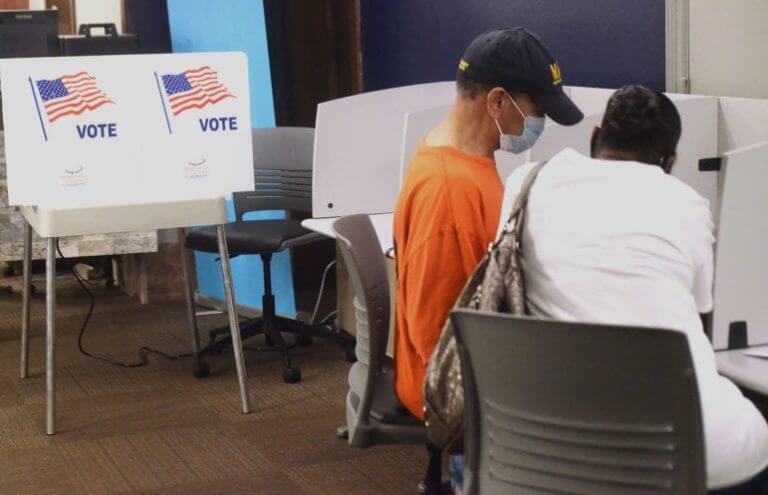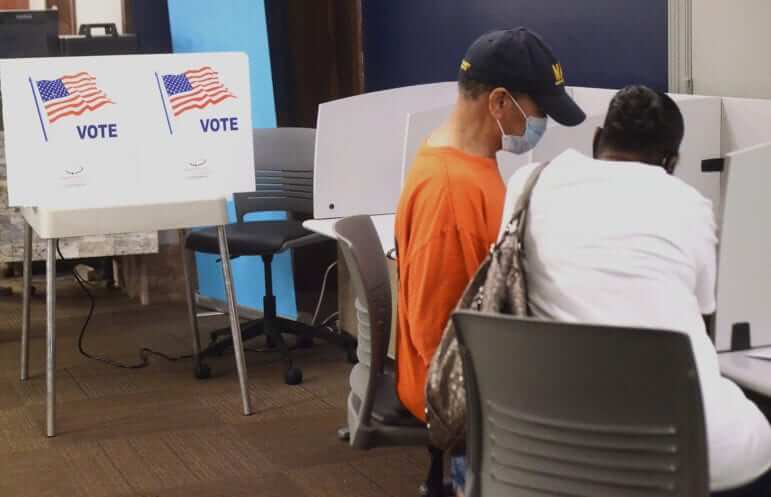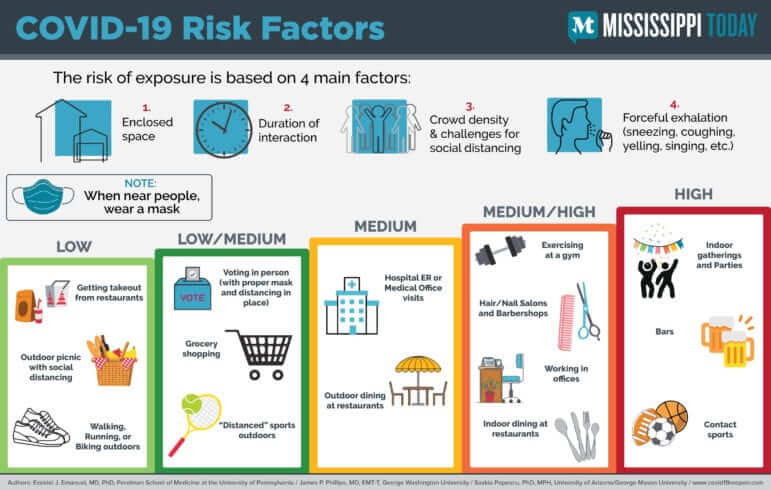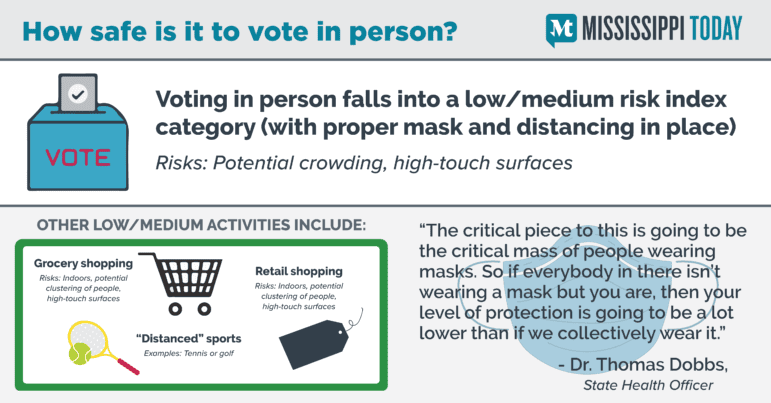

Vickie D. King/Mississippi Today
Irish Simmons and her brother Tyrone Mayes fill out their ballots at the Hinds County Courthouse.
As COVID-19 cases surge, Mississippi voters wonder: How safe is voting in person on Election Day?
By Erica Hensley | October 27, 2020
A 59-year-old voter in Ocean Springs told Mississippi Today she is planning to vote absentee this year by telling her local election officials she’ll be out of town on Election Day.
That will be a lie.
The voter, who asked not to be identified fearing retaliation from election officials, has an auto-immune disease that gives her a higher risk of complications if she were to contract COVID-19, and she doesn’t think her disease qualifies as a disability that would allow early voting.
“I’m very nervous about going into vote, and quite frankly, the only route left to me is to misrepresent the facts and vote absentee,” she said. “… It’s really concerning to me any time, but particularly in pandemic, that there are not allowances made for (high-risk) people in my position.”
Mississippi is the only state in the country that didn’t expand early voting during the global pandemic, and there are only a few specific reasons that someone can vote early. Fear of catching COVID-19 is not one of them, no matter a voter’s risk level.
READ MORE: Mississippi is the only state without early voting for all during pandemic.
Mississippi’s strict voting requirements and loose coronavirus precautions in many counties have concerned many Mississippians, and they wonder whether voting in person on Election Day could be dangerous as state health officials work to slow down another spike in cases.

Voting in person can be done safely, according to numerous public health officials, though there is slight risk. Most experts compare the risk to grocery shopping — tight, often-crowded spaces without a lot of airflow. Their assessment, though, factors in widespread masking. As of mid-October, about three-quarters of Mississippians still reported masking up, though masks will not be required to enter polling places. Some polling places are facing pressure to move booths outside to better protect voters.
Any enclosed, poorly ventilated space can be a breeding ground for COVID-19 spread — the smaller and more crowded the space, the easier a virus can spread from one person to another. Many polling places across the state are just these spaces. Waiting in long lines inside and failing to socially distance also increases risk.
But most spread is traced back to maskless close contact — within six feet — for more than 15 minutes where respiratory droplets are spread from an infected person through contact such as sneezing, coughing or loud vocalizations. The state health department says they’ve traced most cases in the state to just such indoor gatherings, like parties and after school activities.
After high-profile back and forths, the Centers for Disease Control and Prevention formally advised that the virus can be spread through airborne transmission, where it can linger for short periods of time after an infected person has left the area. But experts still think most spread comes from direct droplet spread. Both of these spread scenarios suggest poll workers, rather than voters, are more susceptible to catching the virus, based on time spent interacting with voters. Poll workers will be provided masks, face shields and gloves, according to the state’s election safety guidelines.
Still, some voters are hesitant — especially those who don’t qualify for early voting but are higher risk for COVID-19 complications.
The Ocean Springs voter told Mississippi Today the unclear instructions for someone in her position, combined with the mask mandates coming and going, confuse her. But at the end of the day, she’s most concerned with casting her vote while protecting herself and others. Two Coast counties are back under mask mandates now after sharp spikes. Harrison and Jackson alone recorded an average 14% positivity rate — the percent of positives out of all tests — as of Oct. 17, some of the highest rates in the state.
Multiple other voters told Mississippi Today they had the same plans as the Ocean Springs woman — to say they’d be out of town while casting an absentee ballot.
“I feel like there is a trend to limit voter access, when we could be more creative in making access easier,” she said. “I wish I had a better alternative.”
Other voters are making plans now to head to the polls next week, but they say the absence of a statewide mask mandate and Mississippi’s legacy of suppressing the vote complicate the narrative.
“On that day, we’re probably going to have some people who are sick coming out,” said Germain McConnell, a 47-year-old educator in Columbus. “Some people may have COVID and still come out because they want to vote, especially if they get it late and they can’t do absentee… so really it’s a danger to actually go and vote on that day and not require that people are wearing masks.”
Anyone diagnosed with COVID-19 or under quarantine order can vote early, but early voting in person ends Oct. 31, and mail-in ballots are recommended to be requested at least weeks prior to the election. In reality, those recently diagnosed likely wouldn’t have any option but to vote day-of.
“It’s not even funny, but people are going to get out and exercise their right to vote anyway, which I’m happy about,” McConnell said. “But we are putting people’s lives in danger.”
He added that it’s not just the context of the pandemic that makes the danger of in-person voting hard to swallow — for many, the shadow of voter suppression still looms. “A lot of people lost their lives, lost jobs just battling and fighting for the right to vote,” he said. “If those individuals were that brave and willing to do so, then we can’t let fear of getting some disease keep us from voting and honoring their legacy either … but (the state) not making some allowances during a pandemic — that’s unconscionable and I really don’t understand it.”
He added: “I can’t say that it’s political — I think it may be some people who don’t have the compassion that they need to have or ignorance about this whole situation, but definitely it’s not right.”
Despite growing daily case numbers, Gov. Tate Reeves lifted the state’s mask mandate on Sept. 30, no longer requiring masks for in-person voting. As head of elections in the state, Secretary of State Michael Watson has encouraged masking at polls but will not require them.
On Oct. 19, Reeves reinstated a mask mandate for nine counties, ostensibly requiring masks at polling locations in those counties through Nov. 11. On Sept. 26, seven more counties were added.
Some cities, such as Jackson and Oxford, still have mask mandates in place, which voters say reassures them. But even in counties with a mandate, wearing a mask while voting will be a personal choice of the state’s voters, Reeves reiterated Monday.
This worries Dobbs, who has long advocated for widespread masking, including at the polls.

“The critical piece to this is going to be the critical mass of people wearing masks,” Dobbs said. “So if everybody in there isn’t wearing a mask but you are, then your level of protection is going to be a lot lower than if we collectively wear it. So if it could have been done, or it can be done, that there’s mandatory masks in polling places, I think that’s a fantastic idea.”
He reiterates that in-person voting is not altogether a very risky activity for COVID-19 exposure. But masks are a must for an overall protective effect, even if masking is not entirely universal, he says.
“So I do think it can be done pretty safely,” Dobbs said. “As far as the politics of how it happens, we know how coronavirus is spread, we know what to do to prevent it — you have fewer people in the room, you have stuff outside, you have masks on. So anything we can do to get to that would be beneficial, but I think obviously some of those things are off the table right now as we go into the election.”
The Mississippi State Health Department announced mid-October that they will supply free combination face mask-shields to elderly voters and those with certain pre-existing conditions at drive-thru and county health department testing locations, but the onus will be on voters to pick these up before heading to the polls. These combination masks offer the same baseline protective effect that healthcare workers use interacting with some COVID-19 patients, and tend to limit transmission.
Secretary Watson’s office delivered $500,000 worth of personal protective equipment to polls across the state for poll workers and on a “first come, first serve” basis for voters.
“Is it perfect? No,” Dobbs said. “Is it something else that we can do for folks? Absolutely.”
The post As COVID-19 cases surge, Mississippi voters wonder: How safe is voting in person on Election Day? appeared first on Mississippi Today.
- Mississippi Marketplace: data center ups and downs, alcohol shortages and new manufacturing projects - February 19, 2026
- More Mississippi students are graduating despite pandemic-era disruptions, new data shows - February 19, 2026
- Education advocates says Mississippi needs honest, nuanced school choice discussion - February 19, 2026